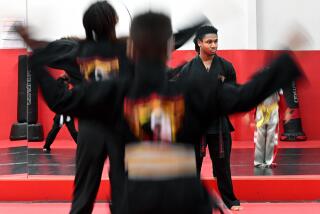OC HIGH / STUDENT NEWS & VIEWS : For Better or For Worse : Divorce: The academic and emotional effects on teen-agers can be devastating. But there are ways to cope.
- Share via
It’s supposed to be “ ‘til death do us part.”
But a majority of marriages end within seven years of taking that vow, according to Census information.
And, unfortunately, the individuals who suffer the most are the children involved, says Nancy Docet, senior therapist at the Assistance League of Fullerton.
“The major problems after a divorce have to do with fears and insecurities. Kids will have so many questions, mainly, ‘Are people going to be there for me anymore?’ ” Docet said. “One half of the support has disappeared, and the kid has a right to feel insecure.”
It’s estimated that in the United States 1 million children watch their families break apart each year
David, a sophomore at Troy High School in Fullerton, confessed to feeling confused when his mother went through her second divorce.
(Students who have requested anonymity are identified by first name only.)
“I was only 10. I thought parents were supposed to stay together,” David said. “I had all these questions in my mind. Why did they get a divorce? What’s going to happen to me? What about college? Am I going to be able to afford it? Sometimes with all these unanswered things in my mind I’d get even more confused because I didn’t know what to be confused about.”
David’s confusion became apparent when his grades plunged from straight A’s to Fs.
It’s not an unusual repercussion. Sixty percent of children struggling through the experience of divorce have academic difficulties, according to a survey by John Hopkins University.
“You get distracted if your attention is directed toward your personal well-being or what others have done to you,” said Mike Mansolino, a counselor at Troy High School. “When you’re distracted, you can’t concentrate. Concentration is school is the link to remaining academically successful or unsuccessful.”
*
Holly, a Troy senior, was more concerned about how her actions might affect her parents.
“When I lived with my dad, my mom used to come over and pick me and my brother up every other weekend. My mom was early one day, and her car was already parked out front when I came walking up after school. I started to worry about who I should hug first, my mom or my stepmom, since they were sitting on the couch together when I walked into the living room,” Holly said.
“I hugged my stepmom first since she was probably feeling insecure. I was only in fourth grade, and it wasn’t until about six years later that I found out that my mom was really hurt by this.”
There are several ways for both the child and the parents to deal with the problems that occur after a divorce. Docet said confiding in someone is possibly the most valuable way to cope.
“It helps with any problem to be able to talk to another person, a safe person that feelings can be revealed to,” Docet said. “It’s important for the kids to talk to other kids who’ve experienced the same thing so they can find somebody who relates and sympathizes with them. Parents should find other divorced parents or support groups to find advice.”
For David, thinking about the emotional and mental repercussions of divorce has made him aware of the responsibilities of marriage.
“I’m really going to wait awhile before I get married, because I don’t want to go through the same thing again,” David said. “Nobody would want to go through a divorce.”
More to Read
Sign up for Essential California
The most important California stories and recommendations in your inbox every morning.
You may occasionally receive promotional content from the Los Angeles Times.













